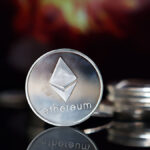JP Morgan, a leading investment bank, has highlighted legal actions against crypto exchanges offering Proof of Stake (PoS) blockchain staking services, such as Ethereum, as a warning for the approval of a spot Ethereum ETF. The bank suggests that until these lawsuits are resolved, the U.S. Securities and Exchange Commission (SEC) is unlikely to approve a spot Ethereum ETF.
Despite some optimism in the market for the SEC’s final decision on Ark 21Shares’ spot ETF application by May 23, 2024, JP Morgan analysts estimate the probability of approval by May to be below 50%. This skepticism is reflected in the narrowing of the Grayscale Ethereum Trust (ETHE) by about 12% in the last two months.
Some speculate that the SEC’s failure to mention ETH in its lawsuits against crypto exchanges may indicate an upcoming classification of Ethereum as a commodity, a prerequisite for spot ETF approval. Others argue that the approval of Ethereum futures-based ETFs last September directly implies ETH’s commodity status.
JP Morgan analysts, led by Nikolaos Panigirtzoglou, are cautious about both arguments. They doubt the SEC will classify ETH as a commodity by May, and they believe the chance of a spot Ethereum ETF approval by then is low.
The analysts also noted Ethereum’s 2022 transition from Proof of Work (PoW) to PoS and its negative impact on the network’s decentralization, suggesting that ETH may now be more akin to other altcoins classified as securities by the SEC, excluding Bitcoin (BTC). Despite the narrative of a potential spot Ethereum ETF, ETH has seen a recent price increase but also a 0.69% drop in the last 24 hours, though it has risen 11.09% in the last 30 days.












